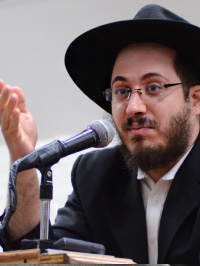If the theme of Pesach is “jumping” to the mindset of redemption, it would only make sense that there must be something that we do on Pesach that helps us leave our boundaries and enter the world of Redemption.
HASHEM’S INVOLVEMENT
 In the early twenties, three Jews immigrated to the United States; their last names were Diamond, Gold, and Taylor. Many years later they met and asked each other to repeat their stories.
In the early twenties, three Jews immigrated to the United States; their last names were Diamond, Gold, and Taylor. Many years later they met and asked each other to repeat their stories.
Diamond: Oh, I’ve done very well. With my name I started a jewelry store. Right from the start it was successful. Now there are Diamond Jewelers all over the country.
Gold: Well, brother Diamond, I too have succeeded. Same idea. Gold? So I started the Gold Ornaments Shop. The shop succeeded wonderfully. The branches spread. Now, I’m a millionaire.
Taylor: With me it wasn’t so simple. My name is Taylor, so I started a clothing store. I worked very hard, but it failed. So I started another, but it also failed. My family, they were starving. So what could I do but pray to God? “Oh, L-rd,” I said, “Help me to prosper. L-rd, if you do, I’ll promise to give you 50 percent of the profits.”
Diamond and Gold: Well, tell us. Did it work?
Taylor: Did it work? You never heard of Lord and Taylor?
And so it is with Pesach. This point is illustrated in the answer to a famous question asked by the sages regarding the name of the current Yom Tov, Chag Ha’Pesach:
Why is it that the name of the Yom-Tov as it appears in the Torah is Chag HaMatzos, yet the accepted name was changed to Chag Ha’Pesach?
The famous Tzaddik Rabbi Levi Yitzchak of Berditchev, known as “the great defender of the Jewish people,” addresses this question in his seifer, K’dushas Levi. He explains that this seemingly minor detail brings out the partnership and connection between the Jewish people and Hashem.
The name Chag HaMatzos stresses the activities of the Jewish people at the time of the Exodus. The Jewish people hurried out of Egypt with only the dough on their backs. This shows their eagerness to be free of Egyptian rule and to serve Hashem.
B’NEI YISROEL’S INVOLVEMENT
The name Chag Ha’Pesach, on the other hand, stresses the involvement of Hashem in the Exodus. Pesach means jumping. Hashem jumped over the Jewish homes during the plague of the firstborn.
The Torah was dictated by Hashem. Hashem, because he loves the Jewish people, refers to the Yom-Tov with the name Chag HaMatzos. Hashem thereby emphasizes the role of the Jewish people during the Exodus. The Jewish people love Hashem. We therefore highlight Hashem’s actions during the Exodus. Thus, the accepted name has become Chag Ha’Pesach.
The Lubavitcher Rebbe (Likkutei Sichos Vol. 12 pg. 160) adds to the above: The name Chag Ha’Pesach is not just the name of the holiday of Freedom; it is also the guide to attaining Freedom.
Pesach means jumping. When a person jumps, both his feet leave the ground. This is analogous to a complete change of attitude and mindset. Before we attain physical freedom, we must have an attitude and spiritual mindset of freedom.
This idea is brought out in the following anecdote:
Things were going badly for Israel. The economy was in a tailspin, inflation was rising, and immigrants were flooding in from all over. Problems, problems, problems, but what to do? So the Knesset held a special session to come up with a solution. After several hours of talk without progress, one member stood up and said, “Quiet everyone! I’ve got it, the solution to all our problems.”
“What is it?” exclaimed voices from all sides.
“We’ll declare war on the United States.”
Everyone was shouting at once. “You’re nuts! That’s crazy!”
“Hear me out!” said the minister. “It’s really quite simple. Follow my logic: we declare war. We lose. The United States does what it always does when it defeats a country. She rebuilds everything; our highways, airports, shipping ports, schools, hospitals, factories, and loans us money, and sends us food aid. Our problems would be over.”
“Sure,” says another minister, “that’s if we lose. But what if we win?”
We must “jump” out of our current limitations and free ourselves of our internal bondage. We must realize that “Yes, we can!” be free of all our limitations, and that will put us in the mindset of Redemption.
FOCUS ON REDEMPTION
If the theme of Pesach is “jumping” to the mindset of redemption, it would only make sense that there must be something that we do on Pesach that helps us leave our boundaries and enter the world of Redemption.
The Baal Shem Tov gave us a special tool. He revealed to the Jewish people that on Acharon Shel Pesach, the spirit of Moshiach is revealed in a very real and tangible way. He said that if we want to internalize it, we should make a special meal called “Seudas Moshiach” (Moshiach’s Feast), and the Rebbeim of Chabad told us to drink four cups of wine at this meal. The Lubavitcher Rebbe adds that while drinking these cups, one should have special Kavana that these cups are connected with bringing Moshiach.
Let us all “jump” together and let us prepare ourselves – by eating Seudas Moshiach and learning about Moshiach, to the revelation of Melech HaMoshiach, now mamash!
Rabbi Avtzon is the Rosh Yeshiva of Yeshivas Lubavitch Cincinnati and a well sought after speaker and lecturer. Recordings of his in-depth shiurim on Inyanei Geula u’Moshiach can be accessed at http://ylcrecording.weebly.com/moshiach-what-we-believe.html. Weekly shiurim on Moshiach topics given by Rabbi Avtzon can be viewed at chabad.info.